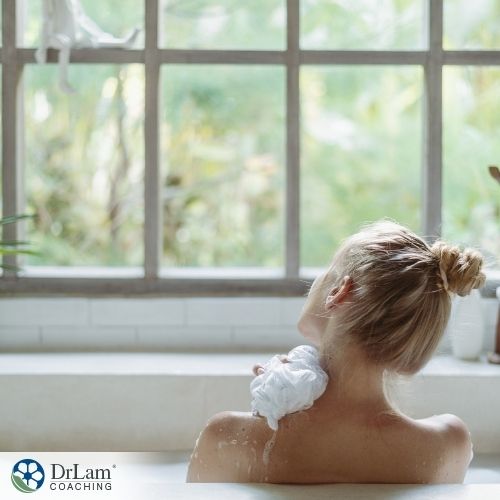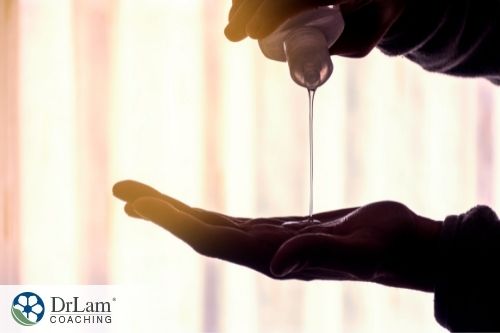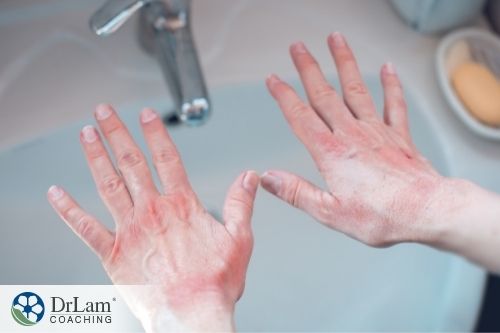 When we want to get really clean, many of us turn to antibacterial body wash. The hope is that it does the job better than regular soap, kills off all bacteria, reduces the risk of infection, and leaves us smelling great. Plus, antibacterial body wash comes in a handy bottle. But research is showing that this kind of soap may not be as healthy as it claims to be. It can contain dangerous chemicals that degrade into carcinogens, lead to antibiotic-resistant bacteria, and cause health problems.
When we want to get really clean, many of us turn to antibacterial body wash. The hope is that it does the job better than regular soap, kills off all bacteria, reduces the risk of infection, and leaves us smelling great. Plus, antibacterial body wash comes in a handy bottle. But research is showing that this kind of soap may not be as healthy as it claims to be. It can contain dangerous chemicals that degrade into carcinogens, lead to antibiotic-resistant bacteria, and cause health problems.
Antibacterial soap ingredients have a long history.
Two of the first antibacterial soaps contained a three percent hexachlorophene dilution. Although available to the public, the chemical was often used in hospitals and clinics. Although this low hexachlorophene concentration was effective in dealing with bacteria and considered safe, it was toxic when used in higher concentrations. Furthermore, disposal was a problem because even a low dilution could be toxic to the environment and could seriously harm aquatic life and algae.
Since then, the active ingredients in an antibacterial body wash have changed. Many contain natural antibacterial ingredients. Others, however, still contain chemicals. These different types of antibacterial body wash have differing antibacterial properties. Note some are also labeled antimicrobial.
Tea tree oil is derived from a genus of plant known as melaleuca, which is native to Australia. Its common name is the tea tree. Although known for its antibacterial properties, tea tree oil has also proven effective when used to treat acne, dandruff, fungal infections, and insect bites. With its wide variety of cosmetic and other uses, tea tree oil is found in many antibacterial body washes.
Bentonite clay, increasingly used in the cosmetics industry, is made from volcanic ash rich in minerals. It binds to toxins and bacteria in the skin and washes them away. People with skin conditions like eczema may find relief when using products containing bentonite clay. The clay also possesses strong antifungal and antibacterial properties.
Eucalyptus oil, derived from the eucalyptus tree, also an Australian native, is often used to relieve sore throats and cold sores. The oil has strong antibacterial properties. The oil may also help with blood sugar control, respiratory tract issues when inhaled, disinfect, and repel bugs. The antibacterial properties in the oil may help deal with cold sores resulting from the herpes virus, and, when used in a body wash, get rid of bacteria.
 Triclosan can reduce or prevent bacterial contamination. It has, for years, been added to personal hygiene products, including various antibacterial body wash products. This chemical has both antifungal and antibacterial properties. Long-term use of triclosan, however, could contribute to health issues. More on this later.
Triclosan can reduce or prevent bacterial contamination. It has, for years, been added to personal hygiene products, including various antibacterial body wash products. This chemical has both antifungal and antibacterial properties. Long-term use of triclosan, however, could contribute to health issues. More on this later.
Triclocarban is a chemical often found in antibacterial hand soap. It does not, however, work on all bacteria. Some research indicates this chemical has certain anti-inflammatory properties. Other research, however, also indicates it could contribute to the development of certain cancers.
This chemical is often used in hospitals as an antiseptic to sterilize medical equipment. It is also often found in the disinfectant soap used in hospitals before surgeons operate on patients. The chemical works by penetrating the cell walls of bacteria and inactivating cellular enzymes, effectively killing bacteria. Besides its use as an ingredient in antibacterial body wash products, it is often used in various household cleaning products.
The molecules in soap have amphipathic properties. This means that they have polar and non-polar properties that allow soap to dissolve most types of molecules. Essentially, this makes it easier to wash dirt and germs away.
When it comes to bacteria or viruses that cause disease, soap works in two ways. Its amphipathic ability means it loosens them from your skin, thus making them easier to wash away. Second, building up suds and washing them off tends to cover more areas of your body. So while soap does not kill these germs, it does get them off your skin and flushed away with water.
Antibacterial body wash has the same properties as regular soap with one difference: the addition of an antibacterial agent. Please note, however, that studies show that while this antibacterial agent may kill some bacteria, it is not effective against viruses.
According to the Food and Drug Administration (FDA), antibacterial body wash does not work better at disease prevention than plain, old-fashioned soap and water. It could also have long-term side effects.
One of these side-effects is the possibility of bacteria becoming resistant to the chemicals in the body wash. This reduces the efficiency of antibiotics in addressing bacterial infections.
Also, several studies have supported the idea tha by stripping away all bacteria, you deny your immune system the chance to strengthen itself by facing off against smaller, less dangerous quantities of different substances. This means your body cannot build up antibodies against some things. It makes both adults and children more vulnerable to developing allergies and having weaker immune systems.
Some research also shows the possibility of these chemicals interfering with your hormones, especially those needed for brain and reproductive development.
Although chloroxylenol shows no significant toxicity when it comes to people, it is toxic to certain animals. Cats are especially susceptible. The chemical may also cause skin irritation and trigger allergic reactions in some people.
 With regards to triclosan and triclocarban, the FDA found that using these chemicals in body products of any kind has no profound benefit, while the risks of using them are unacceptable. For example, one study done on animals and reported in the Smithsonian Magazine found that triclosan may impair muscle function, even when the subjects were exposed to relatively low dosages. Another study, published in the Journal of Allergy and Clinical Immunology, found that over-sanitizing our bodies (and environment) harms our immune health and contributes to the rise in allergies.
With regards to triclosan and triclocarban, the FDA found that using these chemicals in body products of any kind has no profound benefit, while the risks of using them are unacceptable. For example, one study done on animals and reported in the Smithsonian Magazine found that triclosan may impair muscle function, even when the subjects were exposed to relatively low dosages. Another study, published in the Journal of Allergy and Clinical Immunology, found that over-sanitizing our bodies (and environment) harms our immune health and contributes to the rise in allergies.
The chemicals in these body products are also not fully removed by wastewater treatment facilities. They also degrade down into carcinogens. This sludge left over after treatment, which includes the carcinogens, is used as fertilizer, and could thus end up in our food.
Finally, studies show that certain antibacterial agents found in body wash could potentially cause inflammation, which is more serious than it seems.
Inflammation is one of the most common causes of many health conditions, from heart disease to autoimmune disorders to Adrenal Fatigue Syndrome. It is connected to your body’s response to stress, also known as the NeuroEndoMetabolic (NEM) stress response.
Inflammation is your immune system’s way of protecting you, but this also means that many things can cause inflammation.
One way an antibacterial body wash can cause inflammation is by upsetting the balance of good and bad bacteria that naturally lives on your skin. By killing all bad bacteria, you also reduce your exposure to beneficial bacteria. These bacteria help promote balance and protect your skin.
Furthermore, your body regards any chemical as a toxin. Exposure to certain chemicals may also trigger allergies or sensitivities. Inflammation may result. And with inflammation, especially chronic inflammation, you open yourself up to a wide range of health issues. These include, amongst others, mental health issues, inflammatory health conditions like lupus and fibromyalgia, heart disease, cancer, and more.
The only way to tone down your body’s inflammatory response is by addressing all the issues that could cause inflammation. This includes looking at your diet, getting enough sleep and exercise, doing something for your mental health, and, of course, limiting your exposure to environmental toxins as much as possible. This also includes the chemicals found in an antibacterial body wash.
The easiest option would be switching to plain old soap and water the next time you take a shower or bath. If you choose a body wash, consider a natural one that is not antibacterial rather than those made with manufactured chemicals. If the antibacterial properties are important to you over their risks, consider instead using a product with a natural antibacterial agent instead of a chemical one.
If worried that an antibacterial body wash is contributing to your health issues, it's also a good idea to talk to your healthcare practitioner about the situation, or find a natural health practitioner aware of the different ways these chemicals can interact with health, and ask for their advice.
If you would like to know more about or need any assistance regarding your antibacterial body wash, the team at Dr. Lam Coaching can help. We offer a free** no-obligation consultation at +1-626-571-1234 where we will privately discuss your concerns and various options with you. You can also send us a question through our Ask The Doctor system by clicking here.
You cannot say a specific ‘thing’ causes adrenal fatigue. The condition is very complicated. But the effects of an antibacterial body wash could contribute to the many symptoms of the condition. Please talk to your healthcare professional if you believe your body wash causes your symptoms.
